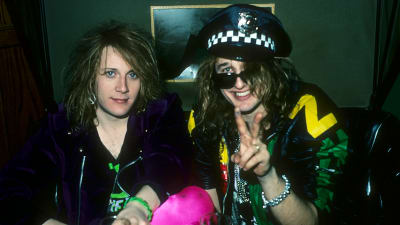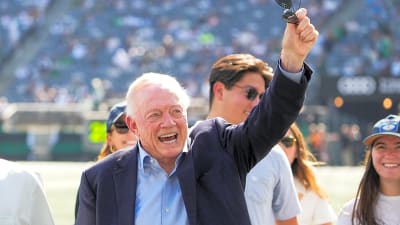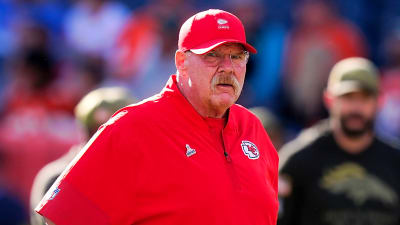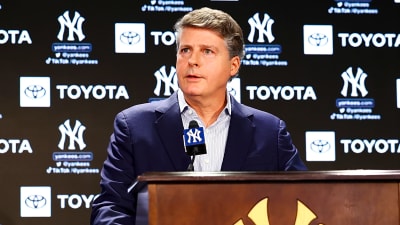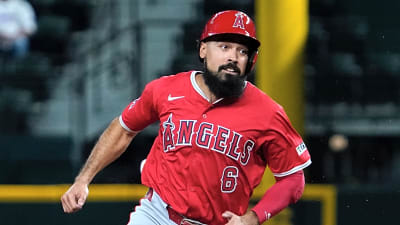- Home
- Quizzes
- My Quiz Activity
- Newsletters
- MY FAVORITES
- Add Sports/Teams
- SPORTS
-
NFL
- NFL Home
- Arizona Cardinals
- Atlanta Falcons
- Baltimore Ravens
- Buffalo Bills
- Carolina Panthers
- Chicago Bears
- Cincinnati Bengals
- Cleveland Browns
- Dallas Cowboys
- Denver Broncos
- Detroit Lions
- Green Bay Packers
- Houston Texans
- Indianapolis Colts
- Jacksonville Jaguars
- Kansas City Chiefs
- Las Vegas Raiders
- Los Angeles Chargers
- Los Angeles Rams
- Miami Dolphins
- Minnesota Vikings
- New England Patriots
- New Orleans Saints
- New York Jets
- New York Giants
- Philadelphia Eagles
- Pittsburgh Steelers
- San Francisco 49ers
- Seattle Seahawks
- Tampa Bay Buccaneers
- Tennessee Titans
- Washington Commanders
-
MLB
- MLB Home
- Athletics
- Arizona Diamondbacks
- Atlanta Braves
- Baltimore Orioles
- Boston Red Sox
- Chicago White Sox
- Chicago Cubs
- Cincinnati Reds
- Cleveland Guardians
- Colorado Rockies
- Detroit Tigers
- Houston Astros
- Kansas City Royals
- Los Angeles Angels
- Los Angeles Dodgers
- Miami Marlins
- Milwaukee Brewers
- Minnesota Twins
- New York Yankees
- New York Mets
- Philadelphia Phillies
- Pittsburgh Pirates
- San Diego Padres
- San Francisco Giants
- Seattle Mariners
- St. Louis Cardinals
- Tampa Bay Rays
- Texas Rangers
- Toronto Blue Jays
- Washington Nationals
-
NBA
- NBA Home
- Atlanta Hawks
- Boston Celtics
- Brooklyn Nets
- Charlotte Hornets
- Chicago Bulls
- Cleveland Cavaliers
- Dallas Mavericks
- Denver Nuggets
- Detroit Pistons
- Golden State Warriors
- Houston Rockets
- Indiana Pacers
- Los Angeles Clippers
- Los Angeles Lakers
- Memphis Grizzlies
- Miami Heat
- Milwaukee Bucks
- Minnesota Timberwolves
- New Orleans Pelicans
- New York Knicks
- Oklahoma City Thunder
- Orlando Magic
- Philadelphia 76ers
- Phoenix Suns
- Portland Trail Blazers
- Sacramento Kings
- San Antonio Spurs
- Toronto Raptors
- Utah Jazz
- Washington Wizards
-
NHL
- NHL Home
- Anaheim Ducks
- Boston Bruins
- Buffalo Sabres
- Calgary Flames
- Carolina Hurricanes
- Chicago Blackhawks
- Colorado Avalanche
- Columbus Blue Jackets
- Dallas Stars
- Detroit Red Wings
- Edmonton Oilers
- Florida Panthers
- Los Angeles Kings
- Minnesota Wild
- Montreal Canadiens
- Nashville Predators
- New Jersey Devils
- New York Islanders
- New York Rangers
- Ottawa Senators
- Philadelphia Flyers
- Pittsburgh Penguins
- San Jose Sharks
- Seattle Kraken
- St. Louis Blues
- Tampa Bay Lightning
- Toronto Maple Leafs
- Utah Mammoth
- Vancouver Canucks
- Vegas Golden Knights
- Washington Capitals
- Winnipeg Jets
- NCAAF
- NCAAM
- Olympics
- Boxing
- Entertainment
- Lifestyle
- Golf
- MMA
- Soccer
- Tennis
- Wrestling
- Sports Betting
- More Sports
- RESOURCES
- My Account
- YB on Facebook
- YB on Twitter
- YB on Flipboard
- Contact Us
- Privacy Policy
- Terms of Service
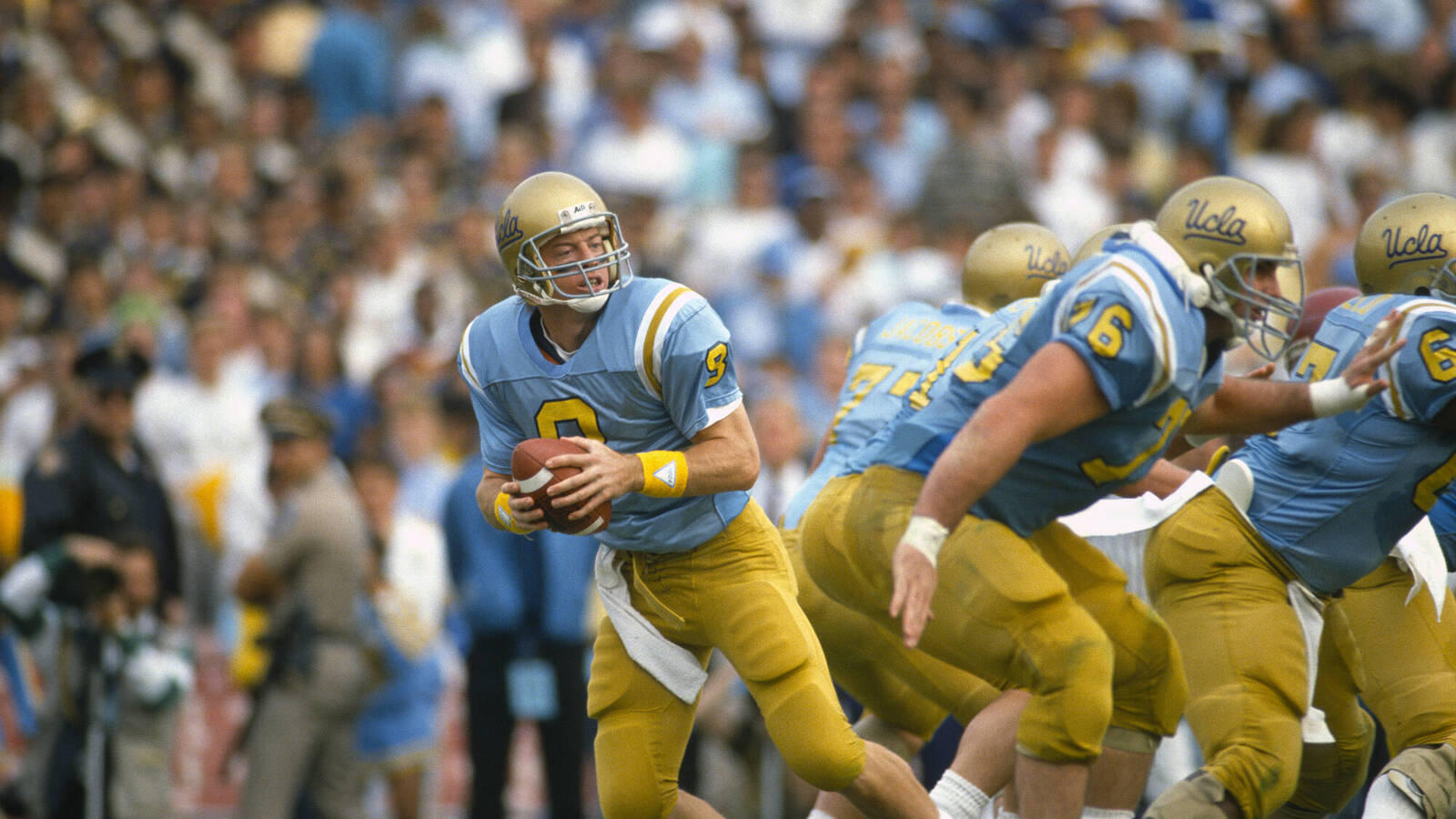
The 20 greatest players in UCLA football history
There have been plenty of exceptional athletes to come through UCLA's football program. It can be tricky to narrow it down to the 20 best in school history, but we gave it a go. Here they are, listed chronologically.
Kenny Washington, Running Back (1937-39)
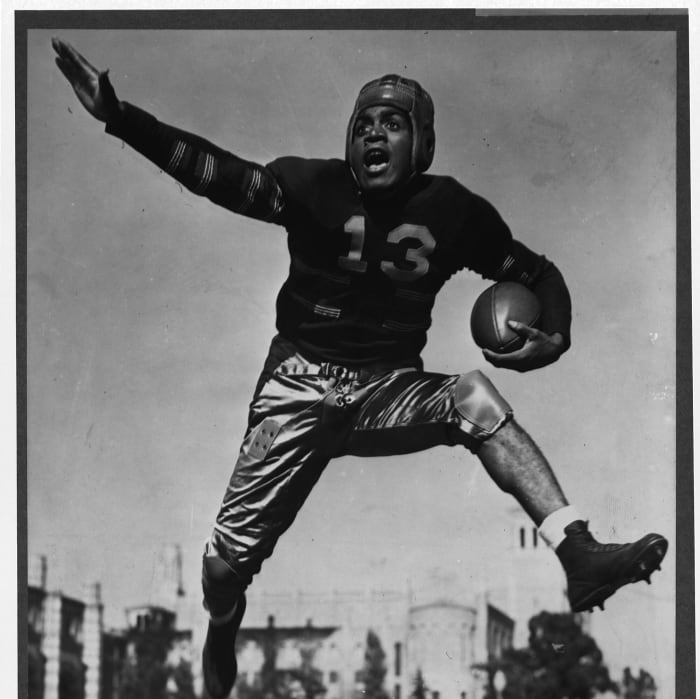
Also a standout on the UCLA baseball team, Washington rushed for 1,915 yards, a school record for more than 30 years, and still ranks within the school's career top 20. Washington also spent time at quarterback and was a starting defensive back. He is considered one of the Bruins' first Black star football players. He was honored as a second-team All-American in 1939, and his No. 13 was retired by the university.
Jackie Robinson, Running Back (1939-40)
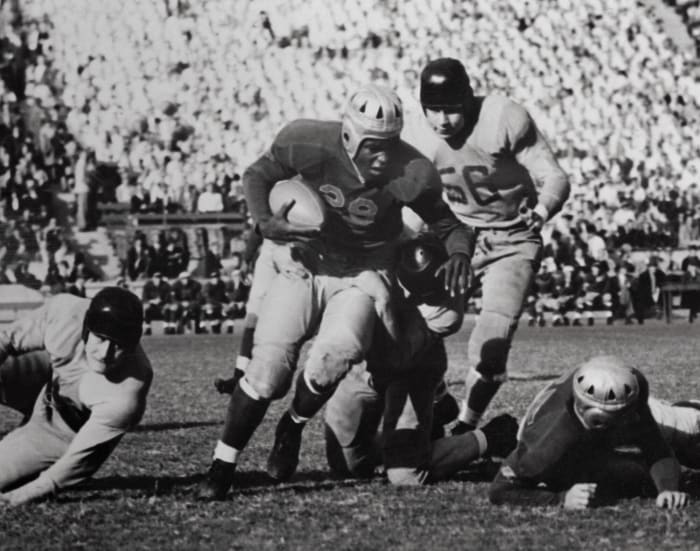
Yes, we're talking about that Jackie Robinson. Perhaps many sports fans didn't realize how versatile as a multi-sport star Robinson was at UCLA. After getting his feet wet at Pasadena Junior College, he became the first Bruin to earn a varsity letter in four sports (football, basketball, baseball, and track and field). In 1939, he joined the aforementioned Kenny Washington and Woody Strode as the three black players in the Bruins' four-man backfield — a total rarity at the time. That squad went 6-0-4, and Robinson earned All-Pac-10 honors. In 1940, Robinson was UCLA's top rusher (383 yards), passer (444 yards), and scorer (36 points). He was also among the nation's top return men and started at safety. Though Robinson wore No. 28 on the football team, his famed No. 42 was retired by UCLA across all sports.
Burr Baldwin, End (1940-42; 1946)
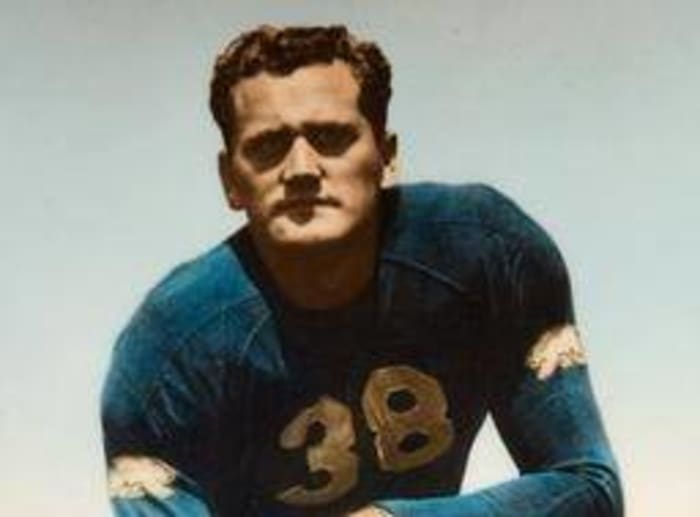
Baldwin's time at UCLA was interrupted by a stint serving in World War II. Before serving, Baldwin scored a touchdown during UCLA's first-ever win over rival USC, 14-7, in 1942. When he returned from serving his country, the pride of California's Kern County and Bakersfield High, Baldwin played well enough to become the first Bruin to earn All-American honors and finish seventh in the 1946 Heisman Trophy race. Though not a member of the College Football Hall of Fame, Baldwin had his No. 38 retired by the Bruins.
Bob Waterfield, Quarterback/Punter (1941-42, '44)

Waterfield was a star for the Bruins before and after serving in World War II. In 1942, Waterfield led the Pacific Coast Conference in passing, throwing for 1,033 yards with 12 touchdowns. He also averaged 40 yards per punt that season. That proved to be his best season, though Waterfield, who played in the annual East-West Shrine Game in his final year, has long been considered one of the greatest players in the history of the Pacific Coast Conference.
Tom Fears, End (1946-47)
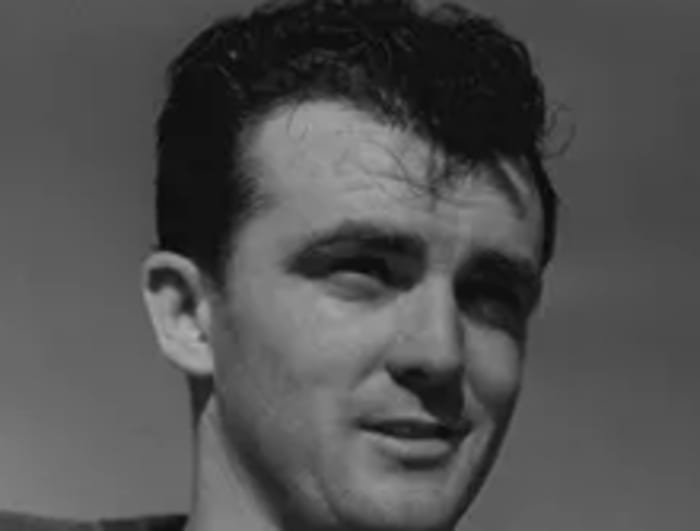
A post-World War II-era star for the Bruins, Fears made an impact in just two seasons at UCLA. Fears was part of the 1946 squad that went undefeated during the regular season, then in his final collegiate campaign was named MVP. He was a first-team All-American each season at UCLA, then went on to star for both the Los Angeles Rams. Fears is a member of both the College and Pro Football Hall of Fame.
Donn Moomaw, Center/Linebacker (1950-52)

Before Moomaw's controversial career as a Presbyterian minister, he was a two-way star for the Bruins during the early 1950s. He's the first UCLA player to be twice named an All-American (1950, '52). Though Moomaw never played in the NFL and spent a little time in the CFL, he is a member of the College Football Hall of Fame, had his No. 80 jersey retired by UCLA, and the "Donn D. Moomaw Award for Outstanding Defensive Player in USC Game" is still presented to this day.
Paul Cameron, Defensive Back/Running Back (1951-53)
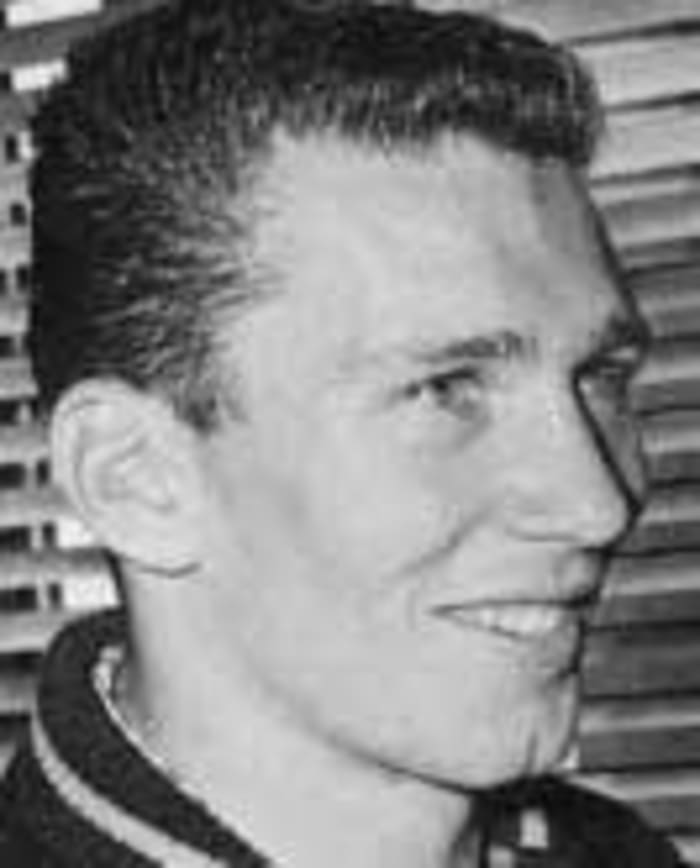
A native of nearby Burbank, Cameron was another two-way star for the Bruins during the early 1950s. In addition to his ability to effectively run the ball and as a defender, Cameron was known to throw the ball. He threw a key interception during the then-undefeated Bruins' 14-12 loss to rival USC in 1952. That said, Cameron is still considered one of the game's best players of that era, finishing third in the Heisman Trophy voting in 1951 and sixth in '52. His No. 34 was retired at UCLA.
Billy Kilmer, Halfback/Quarterback/Punter (1958-60)
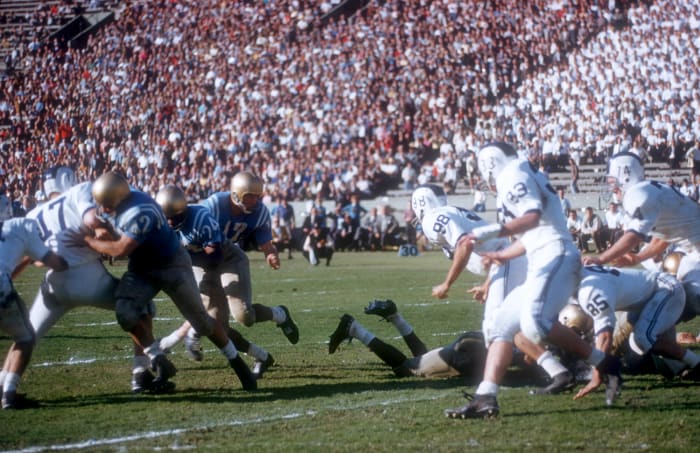
A member of the College Football Hall of Fame, Kilmer got it done with his legs and arm while the focal point of UCLA's single-wing offensive formation. The All-American enjoyed his best season with the Bruins in 1960 when he led the country with 1,869 total yards of offense. He ran for eight touchdowns and passed for eight that season, during which he ranked fifth in the nation with a 42.3 average yards per punt. Kilmer was named MVP of the 1961 College All-Star Game.
Gary Beban, Quarterback, (1965-67)
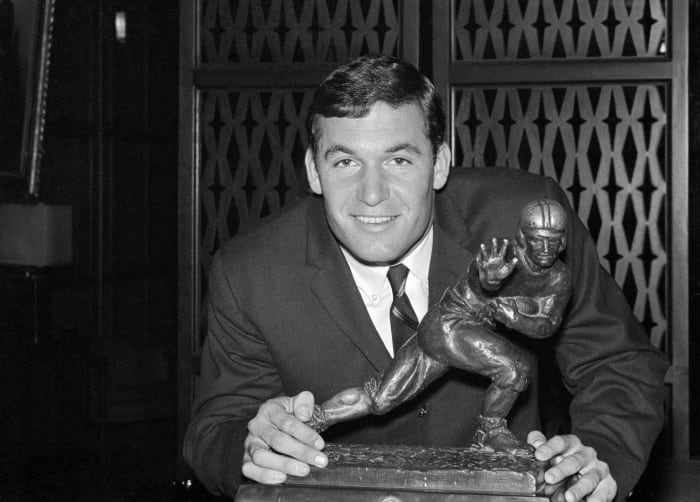
Also known as "The Great One," Beban is still the only Bruin to win the Heisman Trophy. That came during his stellar 1967 senior season when Beban threw for 1,359 yards and eight touchdowns while running for 227 and 11 TDs. A disappointing 21-20 loss to rival USC kept the Bruins from an undefeated season, but Beban also earned All-American honors and won the Maxwell Award in '67. For his career, Beban ranks among UCLA's leading career passes with 4,087, and is ninth all-time in school history with 5,358 combined rushing and passing yards. He ran for 35 touchdowns while passing for 23. A College Football Hall of Famer, Beban's No. 16 has been retired by the school.
John Sciarra, Quarterback (1972-75)
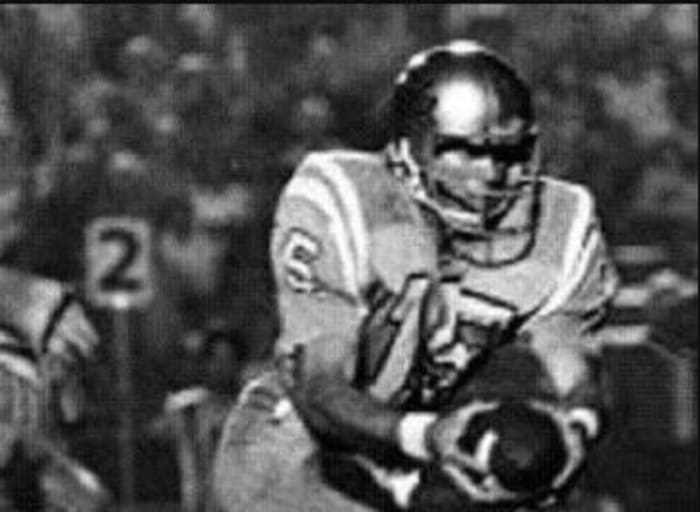
Nearly a decade after Gary Beban starred under center for the Bruins, Sciarra came along and put together a career strong enough to be inducted into the College Football Hall of Fame. During his career, the All-American threw for 2,651 yards, still among the top 20 in school history. Meanwhile, his 1,813 career rushing yards are among the most from any UCLA quarterback. Sciarra's 4,464 total yards are also among the most in annals of Bruins football. Sciarra might be best known for leading UCLA to that famed upset over Ohio State in the 1976 Rose Bowl.
Randy Cross, Offensive Lineman (1973-75)
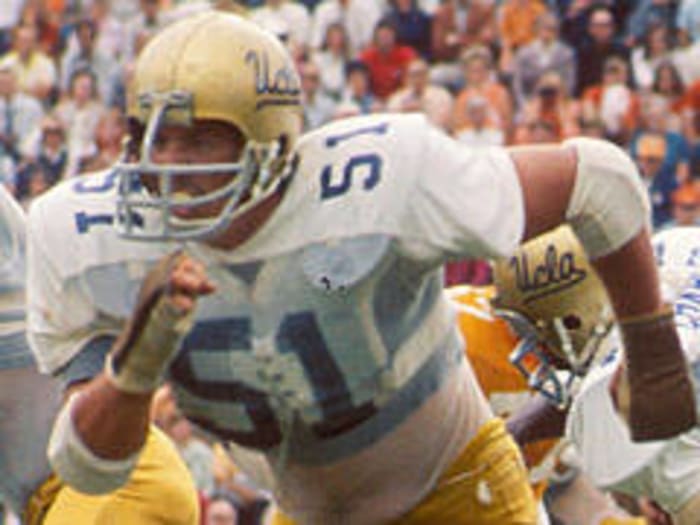
To the casual football fan of a certain age, Cross is best known for his stellar career with the San Francisco 49ers (three-time First-Team All-Pro and three-time Super Bowl champion). The foundation was laid at UCLA, where he started all but six of the 34 games he played and the final 23 of his career. An All-American, Cross was part of the Bruins team that stunned top-ranked Ohio State 23-10 in the Rose Bowl to conclude the 1975 season. He was inducted into the College Football Hall of Fame in 2010.
Jerry Robinson, Linebacker, (1975-78)
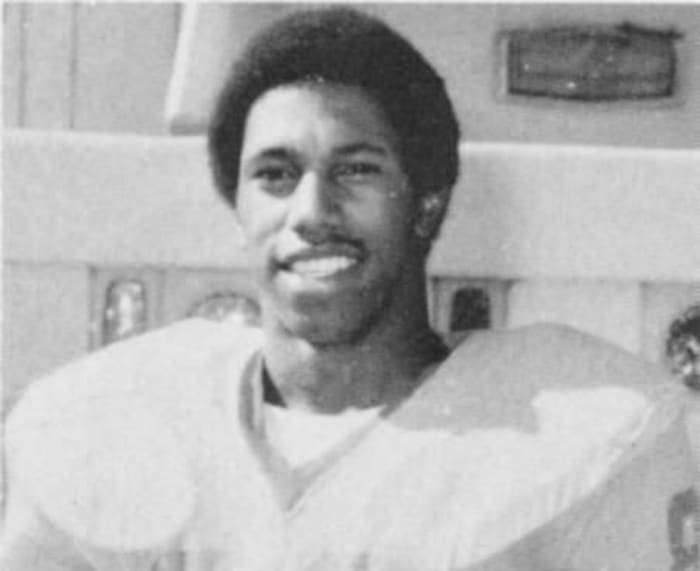
Robinson was recruited to UCLA as a tight end and played wide receiver for most of his freshman season before being switched to linebacker. The move proved beneficial for both parties. His 468 career tackles rank second in program history, while his 161 tackles from 1978 and 159 recorded in 1976 rank Nos. 1 and 2 at UCLA, respectively, for a season. A three-time consensus All-American, Robinson recorded 28 tackles against Air Force in 1976. He also returned three interceptions for touchdowns during his career. It all earned him a spot in the College Football Hall of Fame. Robinson's No. 84 was retired by UCLA.
Kenny Easley, Safety (1977-80)
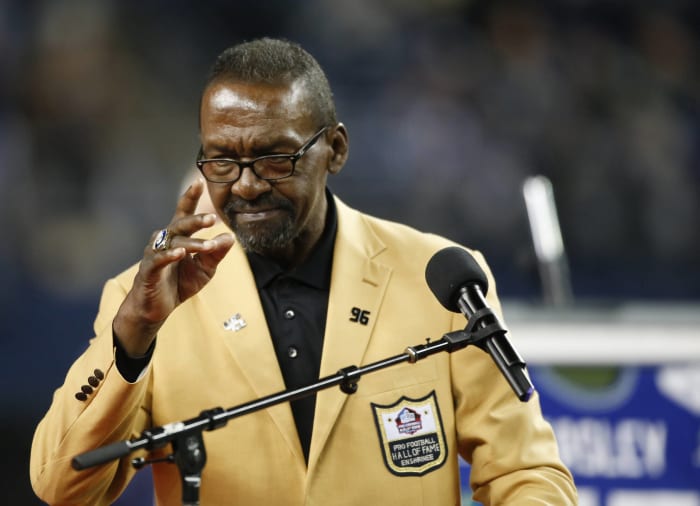
One of the greatest defensive backs in the history of college football, Easley was a three-time consensus All-American. As a freshman in 1977, Easley started most of the season and set a UCLA true-freshman record with 93 tackles. He picked off nine passes that season. For his stellar collegiate career, Easley is the Bruins' all-time leader with 19 interceptions and ranks fifth in school history with 374 tackles. He's a member of the College Football Hall of Fame, and his No. 5 jersey was retired by the Bruins.
Freeman McNeil, Running Back (1977-80)
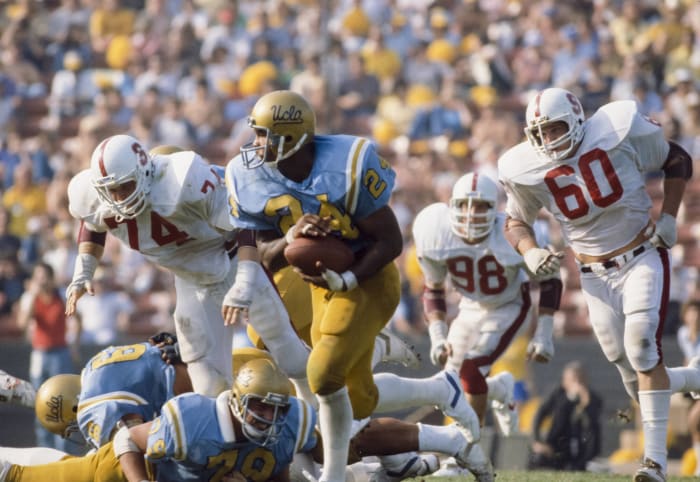
Before McNeil became a three-time Pro Bowler for the New York Jets, he laid the foundation for his NFL success with the Bruins. His 3,297 rushing yards still rank fourth in school history, with 21 touchdowns and an average of 5.3 yards per carry. McNeil recorded 1,396 of those yards in 1979, the fifth-most in a single season from any UCLA player. He was a two-time All-Pac-10 selection and the No. 3 overall pick in the 1981 NFL Draft.
Troy Aikman, Quarterback (1987-88)
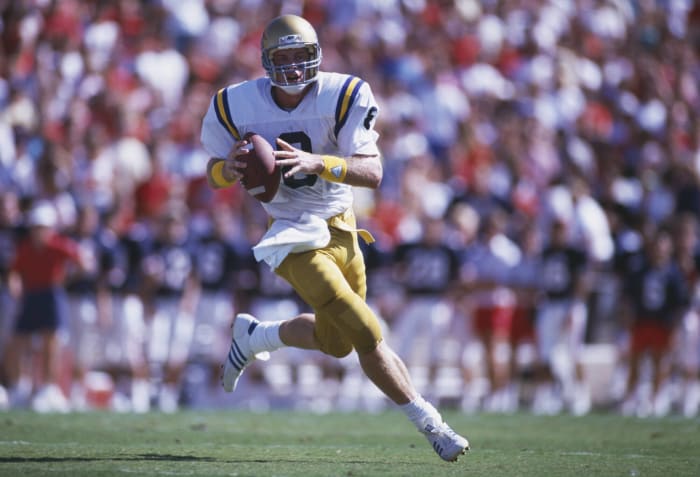
No offense to Gary Beban, but when it comes to UCLA's most recognizable quarterback, Aikman should be at the top of the list. After injuries caused Aikman to lose his starting job at Oklahoma, Aikman landed in Westwood. In two seasons, he threw for 5,298 yards (ninth-most in school history). Aikman ranks among the Bruins' all-time leaders in touchdown passes (41) and completion percentage (64.8). He was the Pac-10 Offensive Player of the Year in 1987 and a consensus All-American and Davey O'Brien Award winner in 1988. Aikman is both a College and Pro Football Hall of Famer and had his No. 8 retired by UCLA in 2014.
JJ Stokes, Wide Receiver (1991-94)

One of the great offensive performers to star at UCLA. When Stokes' four-year college career ended, he was the school's leader with 154 receptions. And, his 82 catches from Stokes' 1993 All-American season still remain a single-season school record. Stokes, the Pac-10 Offensive Player of the Year in '93, when he recorded 1,181 receiving yards and 17 touchdowns (also a single-season school record), still owns the school mark with 28 career TD catches. Stokes ranks fifth in school history with 2,469 receiving yards.
Jonathan Ogden, Offensive Lineman (1992-95)
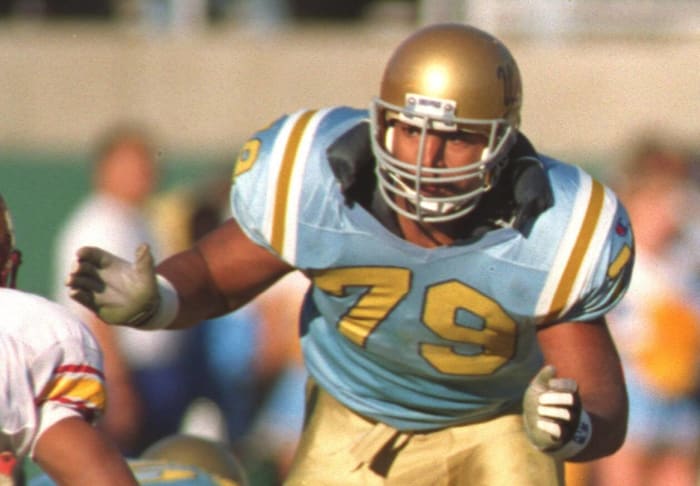
The most recent of the 10 Bruins to have their jersey numbers retired by the university. Ogden, also a standout in the shot put for the UCLA track and field team, was a four-year starting tackle in Westwood. During his junior and senior seasons, Ogden allowed just two sacks. In his final collegiate season of 1995, Ogden was named UPI Lineman of the Year and won the Outland Trophy, given to the nation's top interior lineman. Ogden went on to make 11 Pro Bowls with the Baltimore Ravens. He is a member of both the College and Pro Football Hall of Fame.
Skip Hicks, Running Back (1993-94; '96-97)
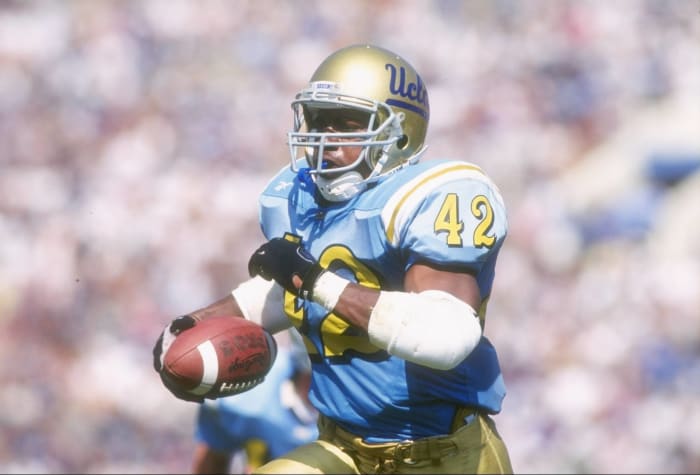
UCLA has produced some of the greatest quarterbacks in college football history, but the program has not been too shabby regarding running backs. Hicks might be one of the more unheralded members on our list. He ranks eighth in school history with 3,140 yards but first with 48 rushing touchdowns and 55 overall scores — the latter is also a Pac-10 record. Hicks' 26 total touchdowns from 1997, when honored as a first-team All-American, are still the most for any Bruin in a single season.
Cade McNown, Quarterback (1995-98)
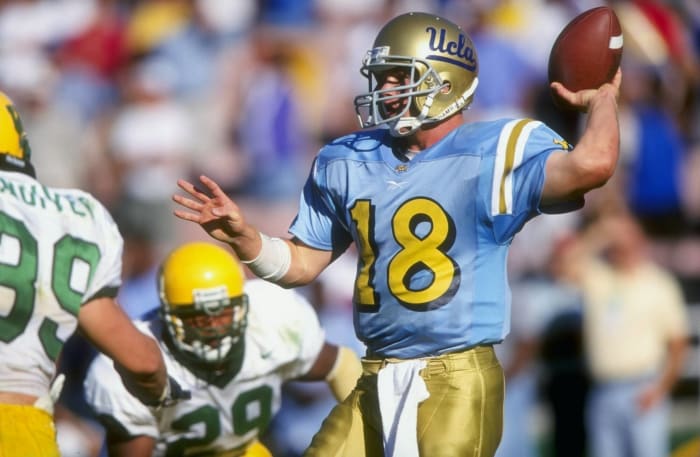
Cade McNown took a lot of heat as a pro quarterback for the Chicago Bears, but nobody can argue the success he enjoyed at UCLA. McNown, who became a starter as a true freshman, is the school's all-time passing leader with 10,708 yards. Meanwhile, he ranks among the school's leaders in completions (694), passing touchdowns (68), and total offense (11,285 yards). The Pac-10 Co-Offensive Player of the Year and Johnny Unitas Award winner in 1998, McNown — a Chicago Football Hall of Fame member — proudly owns the distinction of going 4-0 against rival USC.
DeShaun Foster, Running Back (1998-2001)
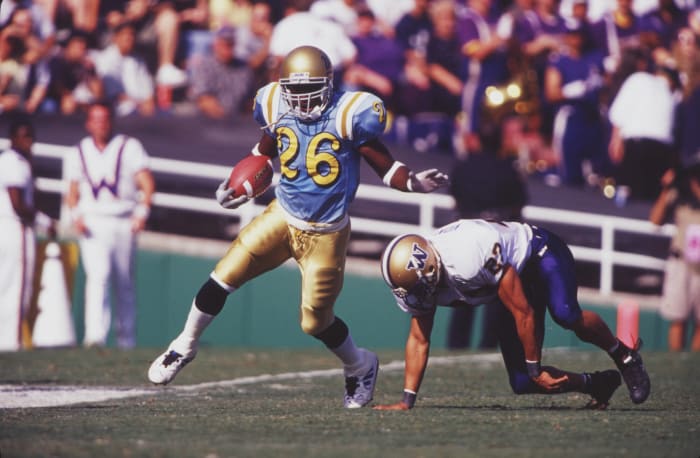
A recent inductee into the UCLA Athletics Hall of Fame and current Bruins head coach, Foster ranks fifth all-time at UCLA with rushing 3,454 yards (1,109 of those yards came during the 2001 campaign). He ranks among the school's leaders with 44 touchdowns. On Oct. 13, 2001, Foster ran for 301 yards and four touchdowns on 31 carries against Washington. It was a single-game school record until Maurice Jones-Drew ran for 322 on 26 carries, also versus Washington, in September 2004.
Dave Ball, Defensive End (2000-03)
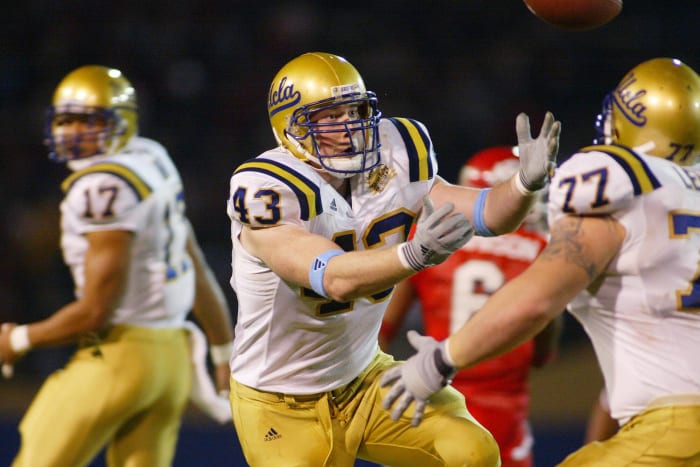
UCLA's career leader with 30.5 sacks. Ball also ranks third in school history with 43.5 tackles for loss. At 6-foot-5 and over 250 pounds, Ball was a rather menacing figure for the Bruins. He started three seasons at UCLA and was twice named a first-team All-Pac-10 performer (2002, '03). He won Pac-10 Defensive Player of the Year and was a unanimous All-American for the 2003 season when he recorded 16.5 of his sacks.
Marcedes Lewis, Tight End (2002-05)

Lewis is the only player in UCLA history to win the Mackey Award, presented annually to the nation's top tight end. That came after the 2005 season, when he also earned All-American recognition for catching 58 passes with 741 yards and 10 touchdowns. Lewis' 126 receptions, 1,571 receiving yards and 21 touchdowns are all records for an UCLA tight end. He's also second all-time for the Bruins in career touchdown catches. Entering the 2025 season, Lewis holds the NFL record for most games played by a tight end (272).
Johnathan Franklin, Running Back (2009-12)
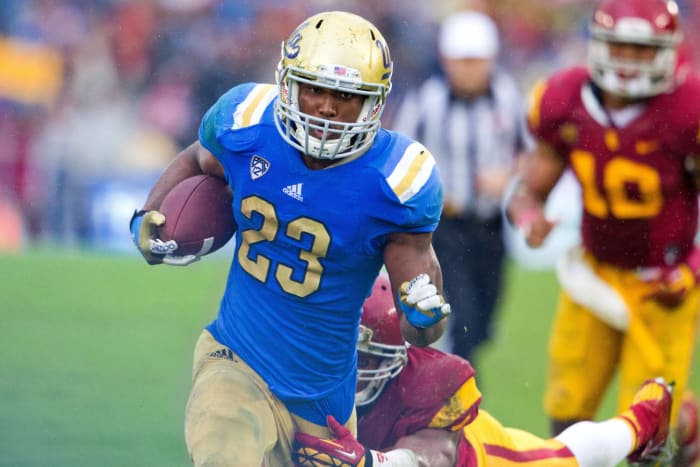
It might surprise casual college football fans that Franklin is UCLA's all-time leading rusher with 4,620 yards. He's the only UCLA player to rush for at least 4,000 career yards. Franklin is also the Bruins' single-season rushing leader with 1,734 from 2012 when he averaged a stellar 6.1 yards per carry. When it comes to all-time scoring, Franklin's 33 total touchdowns rank among the school's top 20. In 2012, Franklin was also named a first-team All-American and finished second for the Doak Walker Award.
Eric Kendricks, Linebacker (2010-14)
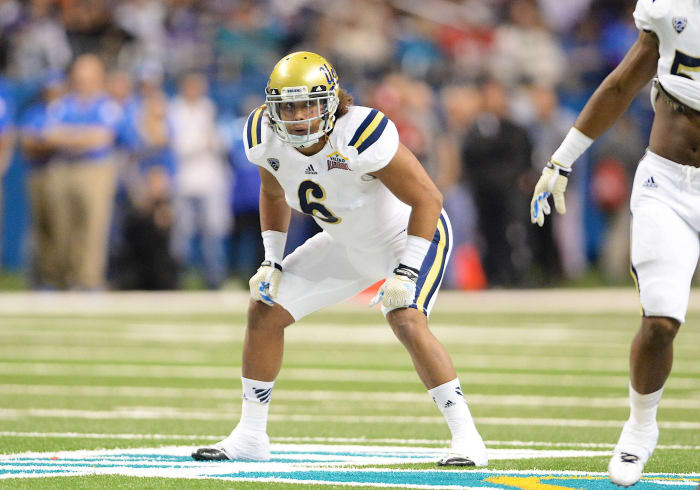
Nobody has recorded more career tackles at UCLA than Kendricks' 481. A beast when pursuing the football, Kendricks had a knack for finding the ball carrier. His 150 tackles from 2012 and 149 during the 2014 season rank Nos. 3 and 4 for a season at UCLA, respectively. At the end of the 2014 campaign, Kendricks became the first Bruin to win the Butkus Award, given to the nation's top linebacker.
Dorian Thompson-Robinson, Quarterback (2018-22)

Injuries and COVID extended Thompson-Robinson's career at UCLA, but the time should come when he's recognized as one special player for the Bruins. Though UCLA was not a consistent winner during Thompson-Robinson's tenure, the popular quarterback certainly left his mark on the program, ranking first in career touchdown passes (88), total offense (12,522 yards) and total touchdowns (116), and second in passing yards (10,695) through 48 games. An all-conference selection, Thompson-Robinson set a school record by completing 69.6 percent of his passes in 2022. He totaled 1,826 rushing yards and 28 TDs on the ground as a Bruin.
A Chicago native, Jeff Mezydlo has professionally written about sports, entertainment and pop culture for parts of four decades. He was an integral member of award-winning sports sections at The Times of Northwest Indiana (Munster, Ind. ) and Champaign (Ill
More must-reads:
- Takeaways from Black Friday's biggest college football games: Texas A&M loses chance at SEC championship
- Ole Miss HC Lane Kiffin doesn't see talk about upcoming decision as a distraction
- The 'Five game-winning-drives in a season' quiz
Breaking News
Customize Your Newsletter
 +
+
Get the latest news and rumors, customized to your favorite sports and teams. Emailed daily. Always free!
PRIVACY POLICY EDITORIAL POLICY CONTACT US
ABOUT YARDBARKER TERMS OF SERVICE
Use of this website (including any and all parts and
components) constitutes your acceptance of these
Terms of Service and Privacy Policy.
This site is for entertainment purposes only.
There is no gambling offered on this site.
Gambling Problem? Call 1-800-Gambler.
